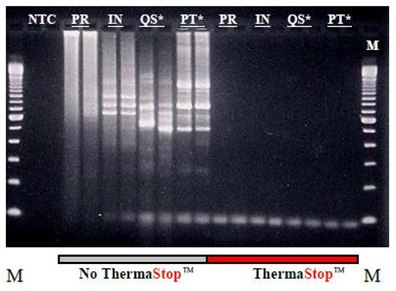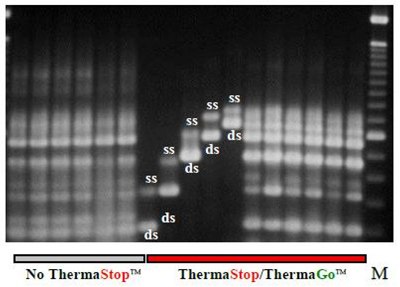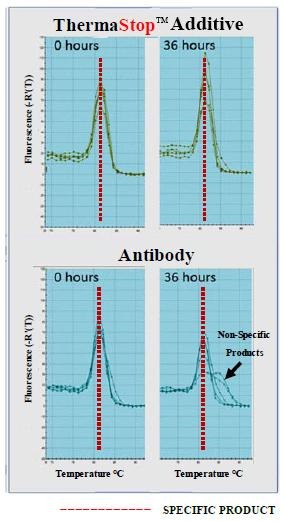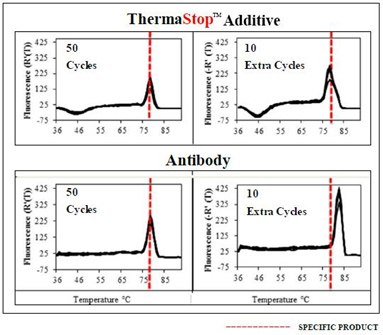ThermaStop™ PCR Additive
Innovative Hot Start and Cold Stop Reagent for Enhanced Taq DNA Polymerase Specificity and Product Yield
The ThermaStop™ additive is a reversible hot start reagent that is compatible with all Taq DNA polymerases. It acts directly on the polymerase to prevent non-specific enzymatic activity below 50 °C. Polymerase activity is fully restored at 60 °C, but is inhibited again by the ThermaStop™ additive by cooling the reaction.
The ThermaStop™ Additive Out-Performs Hot Start Antibodies:
- Effectively suppresses formation of primer dimers/non-specific products before PCR - eliminates amplification in no template controls (Figures. 1 and 2).
- Stabilizes master mixes for extended times - allows convenient preparation and storage of master mixes at room temperature prior to PCR for up to 36 hours (Figure 3).
- Rapidly inactivated in the first PCR cycle - no need for extended high temperature incubation.
- Reversible, immediately re-activated upon cooling - enables resumption of PCR cycling; safeguards product integrity at endpoint for downstream applications, including Next-Gen sequencing and nested-PCR (Figure 4).
- Stable non-aptamer, chemically modified nucleic acid not affected by proteases.

Figure 1 - Universal Hot Start Reagent:The ThermaStop™ additive improves product specificity and yield of commercial non-hot start and hot start Taq DNA polymerases *represents hot-start enzyme, M is 100 bp ladder.

Figure 2 – I Multiplexing Without Extensive Primer Optimization:Five pairs of asymmetric PCR primers not optimized for compatibility in silico were tested either without or with the ThermaStop™/ThermaGo™ (TS/TG) additives. Individual pairs were also amplified with TS/TG. Reactions with TS/TG gave cleaner mixtures of the expected double-stranded and single-stranded amplicons with less nonspecific products. ds, double-stranded DNA; ss, single-stranded DNA; M, 100 bp ladder.

Figure 3 – Extended Hot Start Capabilities of the ThermaStop™ Additive Compared to an Antibody: Melt analysis of a complete master mix including DNA at 25 °C incubated for increasing periods of time prior to PCR.

Figure 4 – The ThermaStop™ Additive Enables Cold Stop After PCR: PCR can be stopped and resumed without altering amplification products. The ThermaStop™ additive safeguards product integrity for downstream applications (e.g. next generation sequencing, nested-PCR).
How To Use:
One unit of the ThermaStop™ additive is defined as the amount required for maximum hot start activity in amplification reactions containing 1 unit of Taq DNA polymerase in a volume of 25 μL. The ThermaStop™ additive does not contain magnesium, dNTPs, or PCR buffer components.
To use, add an equal number of units of the ThermaStop™ additive and Taq DNA polymerase to PCR master mix. Note: PCR annealing temperature should be 60 °C or above to insure full polymerase activity. The ThermaStop™ additive in combination with the ThermaGo™ additive prevent mispriming before, during, and after PCR.
Applications of Interest:
Hot-start protection for all forms of PCR. Enhanced detection of low-copy number targets (single-cell PCR, digital PCR, rare target detection in liquid biopies/tumor samples). Enhances accuracy of highly multiplexed-PCR for targeted next-generation sequencing and other applications.
How to Prepare for Use:
The ThermaStop™ additive is shipped as a dry reagent in 500 or 2500 units. To prepare 5 Units/μL of the ThermaStop™ additive, add 100 μL molecular-grade 10 mM Tris-Cl, pH 8.3 to 500 units dry reagent (500 μL 10 mM Tris-Cl, pH 8.3 to 2500 units dry reagent), vortex 1-2 minutes, then centrifuge briefly. Allow tube to sit at room temperature for 15 minutes with occasional mixing to ensure reagent is completely dissolved.
Recommended Storage:
Store the ThermaStop™ additive at 4 °C or -20 °C in the dark or in light protected tubes. If frozen, divide stock into small volume aliquots to avoid freezing and thawing more than 5 times.
Expected Results:
The ThermaStop™ additive will reduce the production of non-specific products and generate higher yields of the correct products (e.g. stronger probe signals, correct bands on gels) compared to non-hot start conditions.
Materials
如要继续阅读,请登录或创建帐户。
暂无帐户?